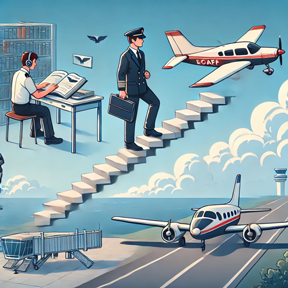Becoming a pilot is a dream for many, offering the opportunity to take to the skies, explore the world, and embark on an exciting and fulfilling career. Whether your goal is to fly commercially, privately, or for the military, the path to becoming a pilot involves a combination of education, training, and certification. Here’s a step-by-step guide to achieving your dream.
Steps to Become a Pilot
-
Meet Basic Eligibility Requirements:
- Be at least 16 years old to fly solo (private pilot) and 18 for a commercial pilot’s license.
- Have a high school diploma or equivalent.
- Pass a medical examination to obtain an FAA Medical Certificate or equivalent certification.
-
Choose a Pilot Training Path:
- Enroll in a flight school or aviation program.
- Consider university programs that combine flight training with a degree.
- For aspiring military pilots, join the armed forces and apply for pilot training.
-
Earn a Private Pilot License (PPL):
- Complete a minimum of 40 flight hours (varies by country).
- Pass the written, oral, and practical flight tests.
-
Advance to an Instrument Rating:
- Learn to fly in varying weather conditions using instruments alone.
- This rating enhances safety and is essential for commercial operations.
-
Obtain a Commercial Pilot License (CPL):
- Complete additional training and flight hours (typically 250 total flight hours in the U.S.).
- Pass the commercial written and practical tests.
-
Consider Further Qualifications:
- Earn a Multi-Engine Rating for flying aircraft with more than one engine.
- Complete Certified Flight Instructor (CFI) training if you want to train other pilots.
- Pursue an Airline Transport Pilot (ATP) certificate for airline pilot roles.
Costs and Financial Considerations
Flight training can be expensive, with costs ranging from $50,000 to $100,000 or more. Scholarships, loans, and grants are available to help offset expenses. Some airlines and military programs also offer subsidized or fully-funded training in exchange for service commitments.
Skills and Qualities of a Successful Pilot
- Strong communication and teamwork skills.
- Quick decision-making and problem-solving abilities.
- Good physical health and situational awareness.
- A commitment to lifelong learning and skill improvement.
Career Opportunities
Pilots can work in a variety of fields, including:
- Commercial airlines
- Corporate aviation
- Charter and cargo operations
- Flight instruction
- Military aviation
Key Takeaways
- Becoming a pilot requires commitment, training, and meeting certification requirements.
- Explore different pathways, such as private, commercial, or military aviation.
- Plan for the financial investment and seek funding opportunities if needed.
- Develop key skills, including communication, decision-making, and adaptability.

